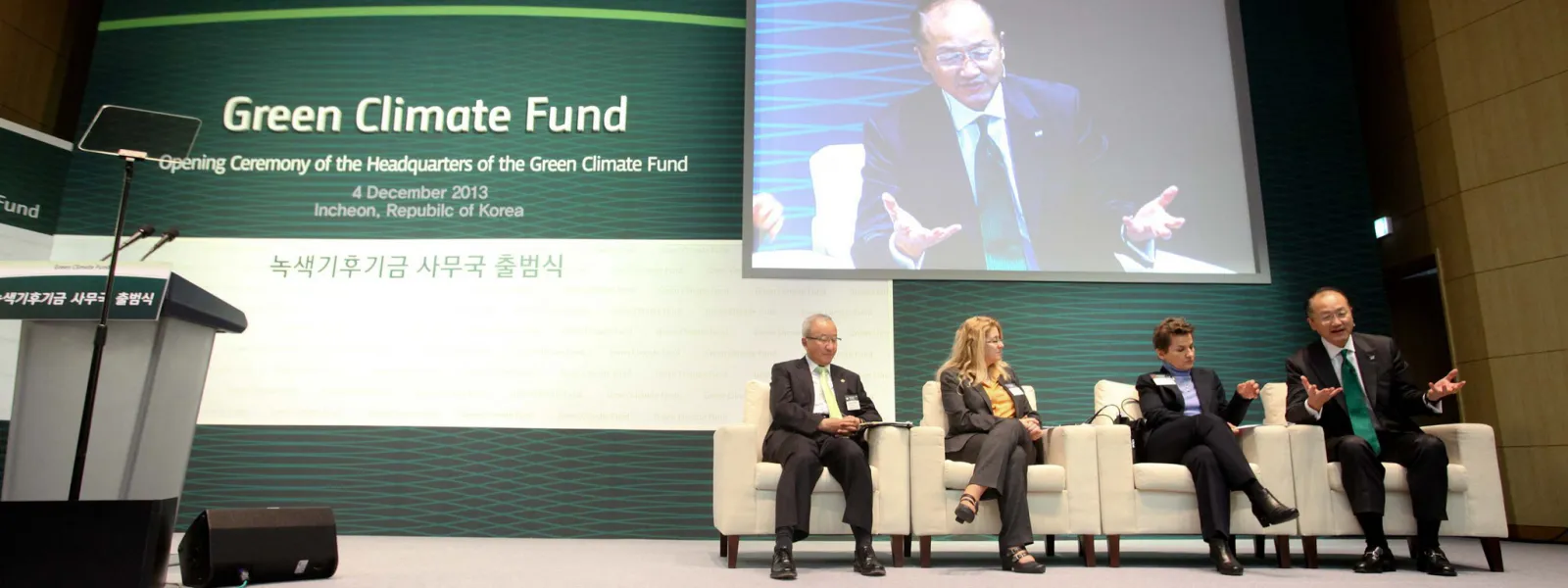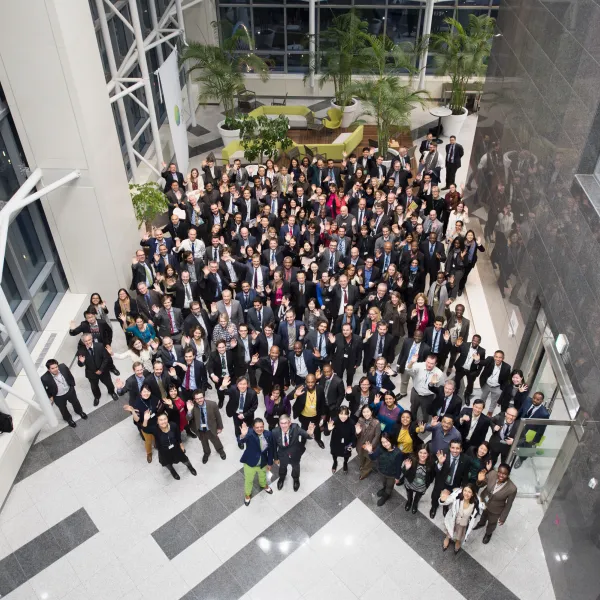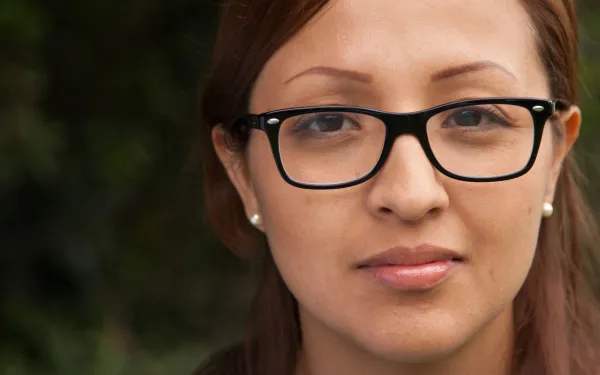
Project
Photo: GCFAdvocating before the Green Climate Fund
The Green Climate Fund is the world's leading multilateral climate finance institution. As such, it has a key role in channelling economic resources from developed to developing nations for projects focused on mitigation and adaptation in the face of the climate crisis.
Created in 2010, within the framework of the United Nations, the fund supports a broad range of projects ranging from renewable energy and low-emissions transportation projects to the relocation of communities affected by rising seas and support to small farmers affected by drought. The assistance it provides is vital so that individuals and communities in Latin America, and other vulnerable regions, can mitigate greenhouse gas emissions and address the increasingly devastating impacts of global warming.
Climate finance provided by the Green Climate Fund is critical to ensure the transformation of current economic and energy systems towards the resilient, low-emission systems that the planet urgently needs. To enable a just transition, it’s critical to follow-up on and monitor its operations, ensuring that the Fund effectively fulfills its role and benefits the people and communities most vulnerable to climate change.
Reports
Read our recent report "Leading participatory monitoring processes through a gender justice lens for Green Climate Fund financed projects" here.
Partners:

Related projects
Latest News
Geneva Conference must give clarity to climate finance
Negotiations for a new climate agreement, initiated last December during the United Nations Framework Convention on Climate Change (COP 20) in Lima, Peru, will continue this week in Geneva, Switzerland. Delegates there will work on detailing the various elements to be included in the negotiating text of the new climate agreement, including climate finance. Climate finance is a key factor in enabling developing countries to confront climate change effectively. "We hope the Geneva session concludes with a negotiating text that provides clarity for predictable and sustainable financing," said Andrea Rodriguez, attorney with the Interamerican Association for Environmental Defense (AIDA). "The agreement needs to establish with certainty the sources of finance, which institutions will mobilize and manage them, and how they will be disbursed, in order to ensure that these efforts contribute to low-emission, climate-resilient development in developing countries." The Conference in Peru ended with the Lima Call for Climate Action, a document whose annexes contain the essential elements for a draft negotiating text of the new climate agreement, which will be signed later this year at COP 21 in Paris. Delegates in Geneva are expected to intensify work on those key elements, and produce a negotiating text that will have legal force under the United Nations Framework Convention on Climate Change. Given the importance of the Geneva conference, AIDA is providing climate finance recommendations for negotiators to incorporate into the draft text of the new climate agreement: Clear provisions regarding who is required to mobilize resources. Clear goals beyond 2020 for a road map towards annual public financing targets. Scaling up of resources to ensure compliance with the existing commitment to mobilize $100 million by 2020, and to allow countries to plan their climate actions. Predictable, adequate and sufficient climate finance to promote the transition to low-carbon, climate-resilient development in developing countries. 50:50 balanced allocation of resources for adaptation and mitigation actions. Definitions of climate finance and climate investment. Clarity on which climate finance institutions will operate under the convention. Recognition of the Green Climate Fund as the primary channel to mobilize resources, without the exclusion of other funds. Strengthen the mandate of the Standing Committee of Finance to enhance coordination and coherence of work between different financial institutions.
Read moreClimate Marchers to Global Leaders: No dirty energy in the Green Climate Fund
New York, NY – As world leaders prepared to announce pledges of climate action and money for the Green Climate Fund, thousands of people flooded the streets of New York City yesterday demanding a financial commitment to clean energy and climate-resilient solutions. Heads of state are gathering at the United Nations tomorrow, at the invitation of UN Secretary General Ban Ki-Moon, in an attempt to jump-start negotiations for a new global climate deal. According to Janet Redman, climate policy director at the Institute for Policy Studies, “Reaching an agreement to stabilize the climate rests on developed countries making good on their promises. Contributions to the Green Climate Fund are past due. We need to see serious commitments from our governments to deliver financing for low-carbon, climate-friendly development now.” Andrea Rodríguez, Mexico-based legal advisor for the climate change program of the Interamerican Association for Environmental Defense (AIDA), added, “Billions of people still lack access to energy. The Green Climate Fund should support communities to meet that need through truly clean, decentralized, sustainable renewable energy. Despite the interest from various sectors in promoting carbon capture, natural gas, and large dams as climate solutions, this institution should not provide financial support for any project that emits greenhouse gas pollution.” The policies established by the Fund's 24 board members, from both developed and developing countries, have so far not excluded any energy sector from receiving finance, increasing the risk that dirty projects could ultimately receive support. “Dirty energy is more than fossil fuels,” noted Zachary Hurwitz, a consultant for International Rivers. “Hydropower dams can release methane, they can destroy carbon-sequestering forests, and they can displace thousands of people. And there’s nothing clean about the human rights violations that all too often result.” Lidy Nacpil, director of Jubilee South Asia Pacific Movement on Debt and Development, based in the Philippines, said, “In my country, we’re already facing the devastation of climate change. Wealthy industrialized countries have a legal and moral obligation to repay their climate debt and support adaptation through the Green Climate Fund. But that’s not enough. The fund must not exacerbate climate change and its impacts by financing dirty energy.” Additional information: Read the latest commentary from the Institute for Policy Studies on the Green Climate Fund. Read the Global South Position Statement on the Green Climate Fund. Read the open letter to governments, international institutions and financial mechanisms to stop considering large dams as clean energy and to implement real solutions to climate change.
Read more
"We want the Green Climate Fund to follow the rules of procedure it has adopted"
AIDA attended the Latin American Carbon Forum 2014 in Bogotá, Colombia. There, our lawyer Andrea Rodríguez participated as a representative of civil society in a panel on the Green Climate Fund (GCF), a mechanism that will mobilize large amounts of resources to support adaptation and mitigation of climate change. Andrea answers a series of questions about the current situation and prospects of the GCF. - What are civil society’s expectations for the Fund? - We have the same expectations as the Fund. We want it to be a transparent, inclusive institution that is constant learning, as stated in Article 3 of its governing instrument. Its focus has to be driven by each country’s determination of what priorities should be funded. It must balance funding for adaptation and mitigation of climate change. We expect the Fund to promote social, environmental, economic, and development co-benefits and taking a gender sensitive approach; men and women are affected to the same degree by climate change. In short, we want the Green Climate Fund to follow the rules of procedure it has adopted. - How can a balance in funding for mitigation and adaptation be ensured? - Financing is given mostly for mitigation projects, despite the great need to fund projects for adaptation to climate change. In Bali, Indonesia, during the penultimate meeting of the Fund’s Board, it was decided that 50% of the funding will go to mitigation and 50% for adaptation. That decision was made and we must ensure that it is followed. Furthermore, in Latin America, development plans and climate change strategies that have been advanced have set adaptation financing as a priority. - How should civil society involve itself in the Fund? - We must go beyond design to implementation. The Fund's governing instrument provides in Article 71 that the Board needs to develop mechanisms to promote the participation of all stakeholders (vulnerable groups, women, civil society and indigenous groups) in the design, development and implementation of projects and programs financed by the Green Climate Fund. There is a mandate for civil society in all stages. The issue is relevant because the Fund will become operational soon and will have to create these participatory mechanisms at the national level, particularly when countries begin to name their national designated authorities (those that collateralize the projects or activities financed by the Fund). It needs to institutionalize these participatory processes. - How can one measure the effectiveness of a project to be funded? - The definition of indicators will be among the topics discussed at the next meeting of the GCF Board, but some are particularly important. In adaptation, we need to consider whether a project can help reduce the vulnerability of a community to climate change. As for mitigation, you have to measure the amount of emissions reduced. But the most important aspect is to measure co-benefits that a project or activity can generate: if it creates jobs, improves people’s quality of life, etc. This is because the Green Climate Fund aims to contribute to a paradigm shift that promotes sustainable development. Helping to improve quality of life is a change of this nature. Many times, projects that have positive climate benefits generate social, environmental, and economic problems. So it is essential that additional benefits are evident in social, environmental, and economic terms.
Read more